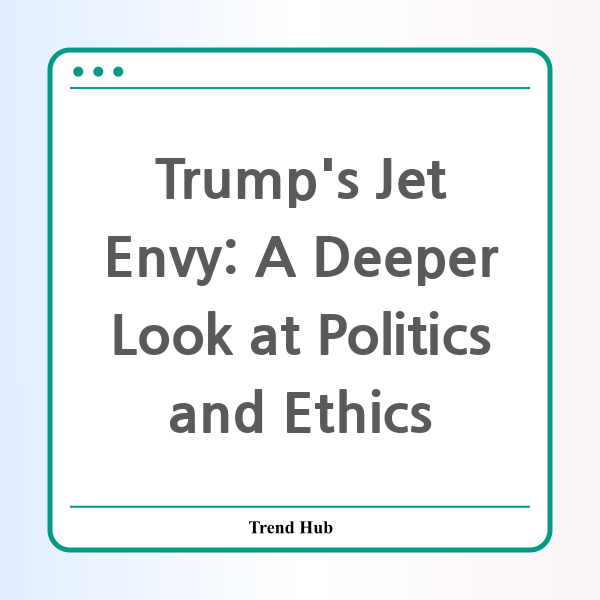* This website participates in the Amazon Affiliate Program and earns from qualifying purchases.

Have you ever wondered how a single jet can signify much more than just transportation? In the world of politics, especially concerning public figures, the implications of such gifts can be substantial. President Donald Trump’s recent alleged acceptance of a luxury jet as a potential gift from Qatar has unveiled a complex web of political ethics and international relations. This phenomenon, often termed as "jet envy," invites scrutiny beyond its initial scandalous nature.
As President Trump disembarked from Air Force One in Riyadh, the opulence of his travel became the focal point of discussions among lawmakers. Questions about the legality and propriety of a U.S. president accepting gifts, especially from foreign nations, resurfaced. The current political climate, with increasing bipartisan support for banning lawmakers from holding stocks while in office, illustrates a growing concern over conflicts of interest.
The concept of political figures receiving substantial gifts raises red flags. While the Trump administration maintains that the proposed plane would be for official use, it’s hard to ignore the potential implications of a family business benefiting from such arrangements. Eric Trump runs the Trump business, which continues to engage in overseas investments and real estate deals, particularly in the Middle East. This connection complicates the narrative, leading to questions about the ethical boundaries of the presidency.
This situation becomes even murkier with reactions from various lawmakers. Notably, some Republicans are unwilling to endorse the idea of a foreign gift, expressing the desire for an American-made jet instead. Such comments from Senator Josh Hawley of Missouri reflect a cautious acknowledgment of the optics surrounding foreign gifts to a sitting president, illustrating an internal conflict within the party itself.
Beyond political optics, the implications of Trump's family business involving investments and financial speculation through cryptocurrency draw attention. Reportedly, an Emirati-backed investment firm has committed to utilizing a cryptocurrency initiated by Trump’s financial endeavor for a significant investment. This duality of his role as a president and a businessman raises serious ethical questions regarding the separation of private interests from public duties.
The concerning aspect of this situation is the apparent lack of oversight. Experts warn that a government official, particularly a president, promoting speculative financial vehicles without proper checks can lead to a myriad of issues, from financial volatility to international diplomatic conflicts. The regulatory environment appears weak, especially with Trump at the helm of financial regulators, which raises concerns about potential misuse of power.
While some argue that Trump does not require financial gain, as pointed out by Hawley, the reality suggests otherwise. Democratic Senator Chris Murphy articulated that Trump’s trips to the Middle East appear to prioritize collecting monetary tribute rather than genuine diplomatic endeavors. This notion further complicates the perception of Trump's motivations during his international engagements.
In this political landscape, where transparency and ethical governance are paramount, the ongoing discourse about potential reforms—such as banning stock ownership for lawmakers—highlights a pivotal moment in U.S. political ethics. The legislation proposed to prevent elected officials from holding investments outside of blind trusts aims to mitigate conflicts of interest, though it currently does not apply to Trump due to his unique business circumstances.
In conclusion, the discourse surrounding "jet envy" transcends a mere fascination with luxury. It encapsulates a broader critique of ethics in public office, the implications of foreign relationships in American politics, and the necessity for stringent regulations to uphold integrity in governance. As the situation unfolds, it prompts us to question where the lines are drawn between personal ambition and public duty, and how the balance of power is perceived both nationally and globally.
* This website participates in the Amazon Affiliate Program and earns from qualifying purchases.